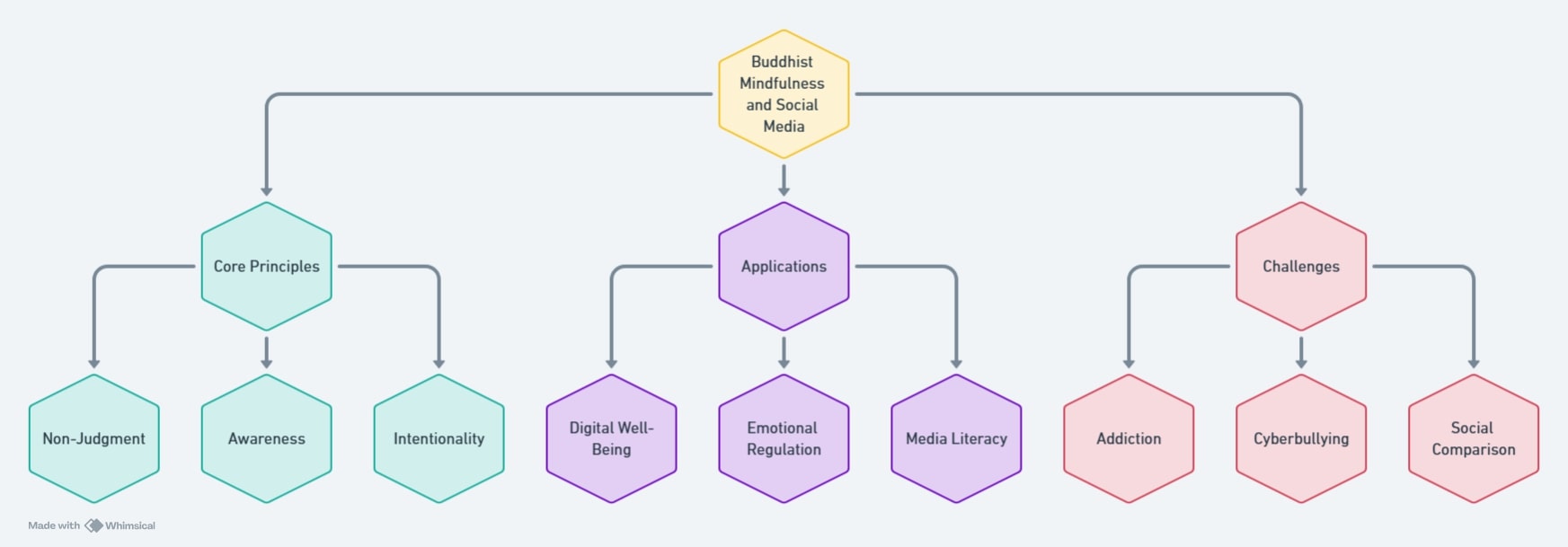The Role of Buddhist Mindfulness in Reshaping Social Media Behavior and Digital Well-Being
คำสำคัญ:
Buddhist Mindfulness, Social Media, Digital Well-Being, Emotional Regulation, Media Literacyบทคัดย่อ
The manuscript, "The Role of Buddhist Mindfulness in Reshaping Social Media Behavior and Digital Well-Being," explores how Buddhist mindfulness principles can positively transform the way individuals engage with social media. In today’s digitally connected world, where excessive social media use has been linked to anxiety, depression, and diminished self-esteem, mindfulness emerges as a powerful tool to promote emotional regulation and enhance digital well-being. The study delves into the origins and essence of mindfulness in Buddhist teachings, emphasizing non-judgmental awareness, present-moment focus, and intentionality. By applying these principles, individuals can develop healthier social media habits, counter the addictive nature of digital platforms, and foster meaningful online interactions. The research highlights mindfulness practices such as deep breathing, reflective pauses, and guided meditations as practical techniques for mitigating the negative psychological impacts of social media. Additionally, the paper underscores the potential of integrating mindfulness into media literacy programs, emphasizing its role in combating misinformation and promoting thoughtful digital engagement. Ultimately, the manuscript advocates for embracing mindfulness as a transformative approach to balance technology use and cultivate resilient online communities.
เอกสารอ้างอิง
Avanzino, J. A., Bangen, K. J., Eglit, G., Hou, B., Jeste, D. V., Lee, E. E., ... & Tu, X. M. (2020). Outcomes of randomized clinical trials of interventions to enhance social, emotional, and spiritual components of wisdom: A systematic review and meta-analysis. eScholarship, University of California. Retrieved from https://core.ac.uk/download/323310961.pdf
Barrows, P., Sapthiang, S., Shonin, E., & Van Gordon, W. (2023). Authentic mindfulness within mindfulness-based interventions: A qualitative study of participants’ experiences. Digital Commons @ CIIS. Retrieved from https://core.ac.uk/download/553636819.pdf
Bhibulbhanuvat, S., Boonrugsa, T., Doungphummes, N., Sasiwongsaroj, K., & Suebwongsuwan, W. (2024). Integrating mindfulness in media literacy: A culture-responsive training programme for older Thai adults. DigitalCommons@URI. Retrieved from https://core.ac.uk/download/604669743.pdf
Biehl, R. (2020). Buddhist psychology and mindfulness: Does it provide a remedy for Western shame?. DigitalCommons@Lesley. Retrieved from https://core.ac.uk/download/326604359.pdf
Bueno de Mesquita, P., Marcotte, M. A., Saikia, M. J., & Tendhar, T. (2024). Online video-mediated compassion training program for mental health and well-being of university students. DigitalCommons@URI. Retrieved from https://core.ac.uk/download/604669801.pdf
Campbell, A. (2024). A short meditation intervention and the impact on Generation Z college students’ anxiety and academic resilience. Scholars Crossing. Retrieved from https://core.ac.uk/download/621476009.pdf
Capiro, N. M., Gleason, A. L., & Powers, S. (2019). The impact of a neuroeducation-based wellness curriculum on Generation Z: Implementing mind-body connection. Grupo Compas. Retrieved from https://core.ac.uk/download/228460876.pdf
Chaiveeradech, M. Bridging digital media literacy with the Thai context of ‘Sati’ (mindfulness). Retrieved from https://core.ac.uk/download/491116169.pdf
Dhiman, B. (2023). Media Role in Promoting Values & Meditation for Sustainable Development: An Overview. Anatomische Gesellschaft. Retrieved from https://core.ac.uk/download/576856909.pdf
Elander, J., Tremblay, L., & Van Gordon, W. (2024). Toward greater clarity in defining and understanding nonattachment. Springer. Retrieved from https://core.ac.uk/download/613047994.pdf
Elder, H. H. (2020). Be Still: A pedagogical analysis of mindfulness-based practices in vocal music education. Scholars Crossing. Retrieved from https://core.ac.uk/download/365589534.pdf
Gurewitz, K. I. (2020). Mindful of a profit? A critical analysis of meditation apps in the context of neoliberalism and Western constructions of religion. Sound Ideas. Retrieved from https://core.ac.uk/download/345769110.pdf
Henderson, S. (2017). Digital mindfulness: An emerging field of inquiry and practice. DigitalCommons@Lesley. Retrieved from https://core.ac.uk/download/490617242.pdf
Koch, C. (2023). Mediating Buddhism: The investigation of Buddha brands in London. Retrieved from https://core.ac.uk/download/597766299.pdf
Moqbel, M. (2020). Understanding the relationship between smartphone addiction and well-being: The mediation of mindfulness and moderation of hedonic apps. AIS Electronic Library (AISeL). Retrieved from https://core.ac.uk/download/326835823.pdf
Repetti, R., Purser, R., Forbes, D., & Burke, A. (2016). Meditation Matters: Replies to the Anti-McMindfulness Bandwagon. Retrieved from https://core.ac.uk/download/145643226.pdf
Roseman, E. J. (2022). Re:Connection: Exercises in unplugging and mindfully reconnecting. DigitalCommons@RISD. Retrieved from https://core.ac.uk/download/553611141.pdf
Sebastião, L. V. (2019). The effects of mindfulness and meditation on fake news credibility. Retrieved from https://core.ac.uk/download/293629774.pdf
Sivek, S. C. (2018). Both Facts and Feelings: Emotion and News Literacy. DigitalCommons@Linfield. Retrieved from https://core.ac.uk/download/212894731.pdf
Soffer, E. D. (2024). The lived spiritual experience of aging adults (≥65). IUScholarWorks. Retrieved from https://core.ac.uk/download/616424049.pdf

ดาวน์โหลด
เผยแพร่แล้ว
รูปแบบการอ้างอิง
ฉบับ
ประเภทบทความ
หมวดหมู่
สัญญาอนุญาต
ลิขสิทธิ์ (c) 2024 วารสารวิชาการสังคมศาสตร์สมัยใหม่ (Online)

อนุญาตภายใต้เงื่อนไข Creative Commons Attribution-NonCommercial-NoDerivatives 4.0 International License.





